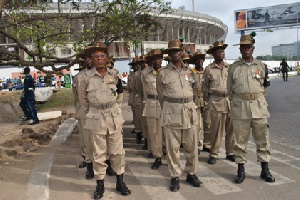The Veterans Administration, Ghana (VAG) would on November 11, mark the 100th year anniversary of World War I which broke out in Europe.
Colonel Chris Nutakor, Executive Director of VAG speaking at a press conference on the Remembrance Day centenary known as the “Red Poppy” said the day is a sign of respect to the dead military men who died through the World War I and II in their bid to protect and maintain peace in the country and the world at large.
Colonel Nutakor, said the day was to signify the end of the war and to immortalize the achievements of the compatriots who died in the war.
He said the celebration would be used to sell Poppy to civilians to enable the administration to raise enough funds to support unfortunate relations, who in the course of duty got incapacitated and left families in desperation.
He urged Ghanaians to acknowledge and recognize the services of the compatriots, who have sacrificed their lives for the peace the country enjoys today and reminded the people to do away with any activity that would bring conflicts, adding that, there is no substitute for peace.
Colonel Nutakor said the association is calling on Ghanaians and all stakeholders to support the Administration to help the aged and destitute veterans to live worthy lives after service.
He urged Ghanaians to wear the poppy in their offices, market places, churches, the sports arena and places where there are human activities to show its importance to ensure that proper attention is given to this day.
Colonel Nutakor said Ghanaians must attach importance to the day and do away with conflicts and weapons to ensure that such an unfortunate incident does not occur again in the country and other parts of the world.
World War I broke out in Europe, Ghana then (Gold Coast) became deeply involved in the war by virtue of being a colony of Britain, which fought alongside its allies such as France and the U.S.A.
Britain’s influence was greatly felt as it was the colonial master of most West African countries such as Nigeria, Gambia, Sierra Leone and the Gold Coast.
Together with these countries, the Gold Coast contributed personnel to make up for what became the Royal West African Frontier Force, which participated in both World Wars I and II.
Regional News of Sunday, 12 October 2014
Source: GNA
VAG to mark World War I anniversary
Entertainment
















